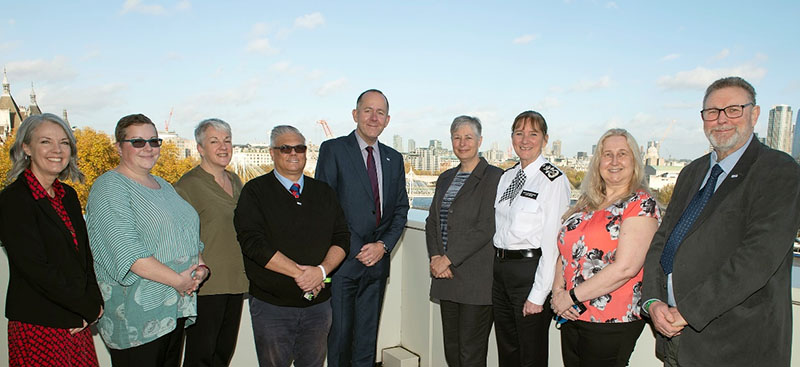by Tracy Betts
President | Disabled Police Association
Over the past year, the DPA Executive Committee has continued to work tirelessly at national and local levels, reinforcing its legitimacy as an organisation over and over again, demonstrating its credibility as key stakeholders in high level decision making with the Home Office, the National Police Chiefs’ Council and College of Policing.

In September last year we hosted a joint conference with the NPCC with great success. Delegates from all over the country, representing their networks and Forces were treated to inspirational speakers and a fantastic awards evening, recognising the dedication and commitment of those who strive to make a career in policing and our services accessible to all. The conference theme, ‘Conversations with Confidence’, was so apt given the last few turbulent months we’ve had in policing.
I took over from Simon Nelson on 23rd November last year and within a couple of weeks, we as the DPA had to challenge the most senior police officer in the country, Sir Mark Rowley, Commissioner of the Metropolitan Police, regarding media reports in the wake of the interim findings of the Baroness Casey Review.
I’m pleased to say we were invited to meet with the Commissioner in person, and we had a constructive conversation about the way forward. Sir Mark acknowledged that the Met had a lot of work to do and looking again at how his disabled staff and officers were treated were part of these plans.
Now, as the Casey review has been published in full and we all know the content, we as the DPA reinforce our commitment to continue to be the voice for change, and we will work with all Forces to help to achieve equity for all our members.
We will robustly and unapologetically challenge any leader, organisation or culture which fails to stand up to discrimination in whatever form it takes.
We know that the findings of the Casey review are not unique to the Met and because of this, the 12 point Action Plan the DPA set the Metropolitan police will be extended to all Forces.
We will not wait to be invited for our opinion but will be taking the challenge to the doors of Chief Officers.
As well as this level of engagement, the DPA give practical, meaningful support to colleagues, empowering local networks even further. For example, we continue to lead regular support sessions for Forces on how to achieve Level 3 Disability Confident status and deliver workshops and forums for local networks to share best practice. We’ve been key contributors to many important work streams such as the College of Policing Workplace Adjustment Toolkit.
As members of the National Fitness Testing Working group, we have ensured disability-related issues are considered throughout when looking at what our job-related fitness testing should look like.
The DPA has continued to be a main contributor in national programmes for digitally accessible police systems, and also lobbies for greater disability representation as part of the Police Uplift Programme, and now the Stakeholder Engagement Group.
As members of the NPCC DEI Consortium as well as working with the other national networks, trade unions and staff associations, the DPA will continue to embrace the benefits of working in partnership, from the advice and support we gain from the Police Superintendents Association to our NPCC Lead, Chief Constable of North Wales, Amanda Blakeman. To all our partners, we’d like to say Thank You, and we look forward to building stronger links with you all throughout this forthcoming year.
Of course, all this work is being done as well as the day-to-day engagement with colleagues and networks at all levels, remembering that each member of the DPA carries out their responsibilities over and above their day job and – because they are so passionate – often in their own time.
With COVID still very much a threat to the wellbeing of colleagues with compromised immunity, there are still challenges to how we do business and support our members. However, there hasn’t been any let-up in the pace, and as the DPA committee and disabled people often do, they have made it work and delivered time after time.

The DPA will continue to listen to our local disability networks and focus our efforts on those issues that matter most to them.
We have heard that increasing diagnoses of ADHD and the prevalence of this and other neurodivergent conditions continue to be on the increase. Increasing representation in our local networks from the deaf, hard of hearing and visually impaired communities has meant that we now have more opportunity to better understand the challenges of working in the police service and how services are accessed.
We know that the mental health crisis and PTSD is also of significant concern, demonstrated by an alarming increase in the rates of deaths by suicide of our colleagues. We commit to doing all we can to ensure tragedies such as these are always kept in the consciousness of the decision makers.
It’s also important we look at the medical requirements for new joiners as well the pension implications that go alongside them. This includes the cross-cultural implications for people with certain conditions, automatically ruling some out of a career as police officers.
Continuing to focus on our built environment is vital – it’s 2023, but our staff are still not able to move easily about our police estates. We must increase our efforts to ensure that everyone can access everywhere at work.
Accurate data collection is key, and we will be continuing to put pressure on those who collate workforce data: making sure they ask the right questions, sharing that information in an open and transparent way to highlight themes and trends, and holding to account those who don’t comply.
Although anecdotal evidence is important, we cannot begin to tackle the issues effectively without the facts to back those lived experiences up. We already know – and this has been borne out by the Baroness Casey review – that the way we do business inside our organisations has a direct correlation with the quality of the service we deliver to the public.
To that end, our 2023 conference, which will be held on 20th and 21st September in Hinckley, Leicestershire will reflect this. This year’s theme is ‘Valuing our People’ – our conference will help and inspire all delegates to:
- Improve community cohesion and build strong, happy, safe, and inclusive environments together
- Recruit, retain and progress our talent by listening, empowering, and championing people with diverse abilities
- Improve our procurement processes and understand the importance of accessible technology in building an inclusive culture
- Release capacity and become better at preventing and detecting crime and keeping people safe
We look forward to seeing you there – more information will be posted soon.
Here’s to the next 12 months. ∎
